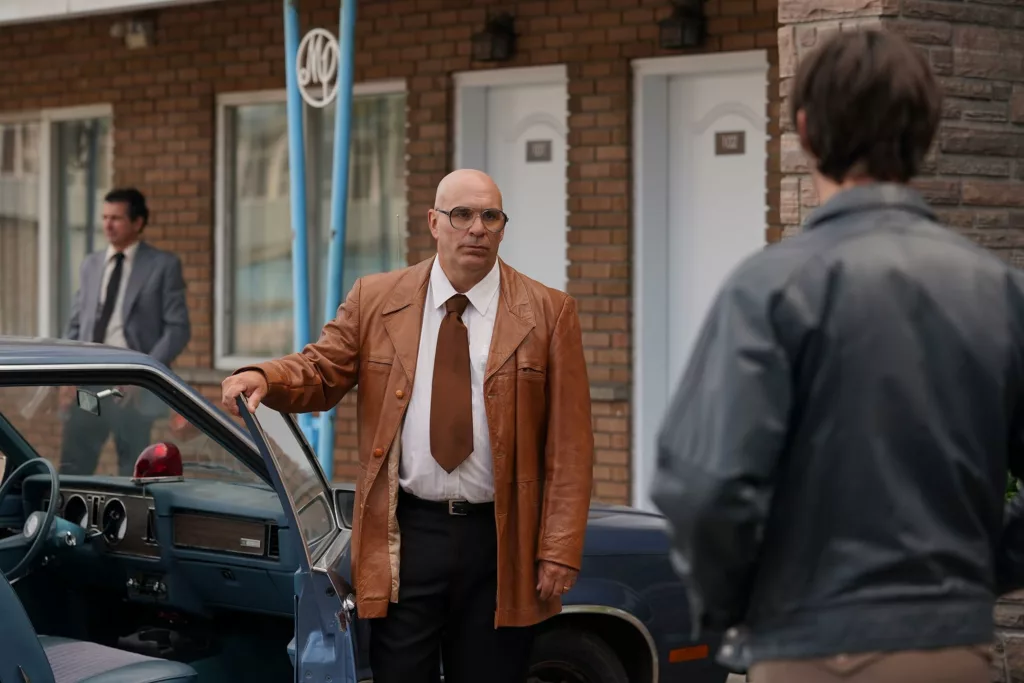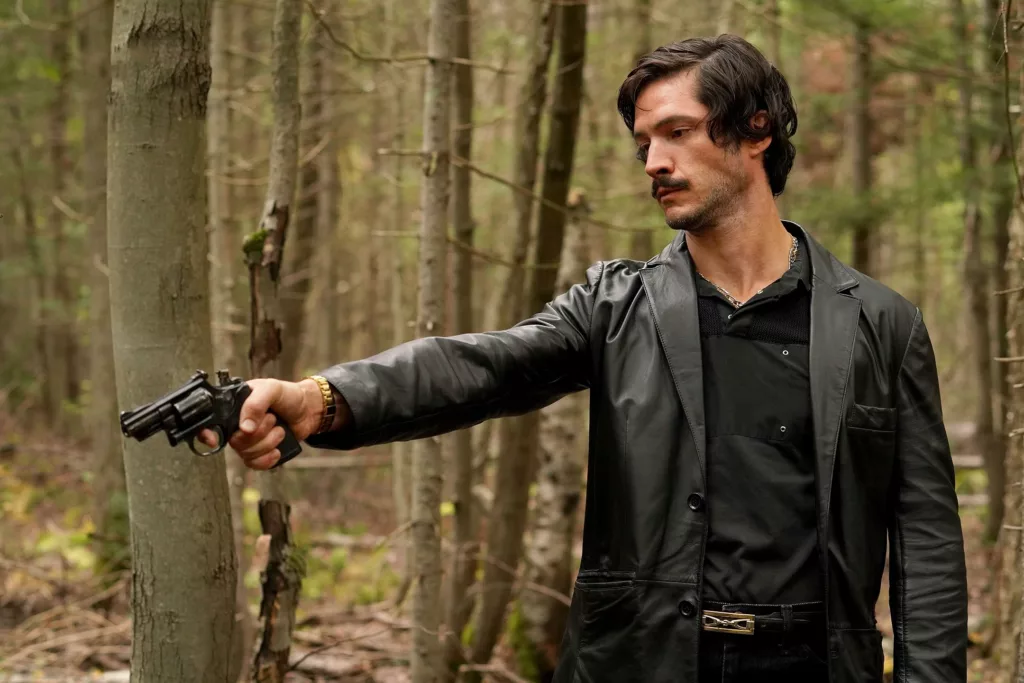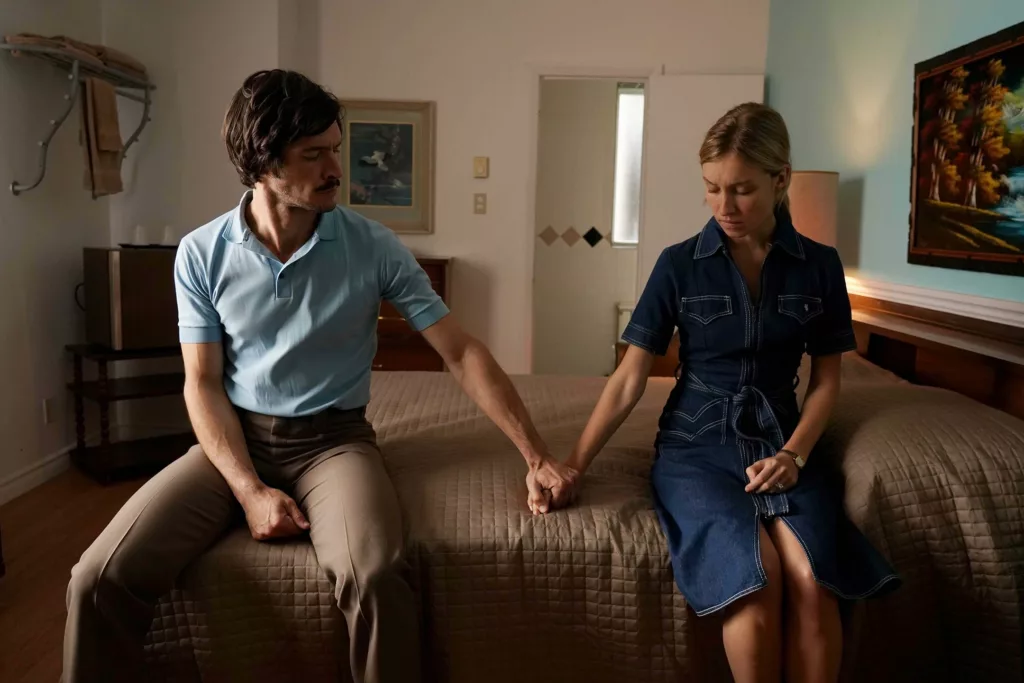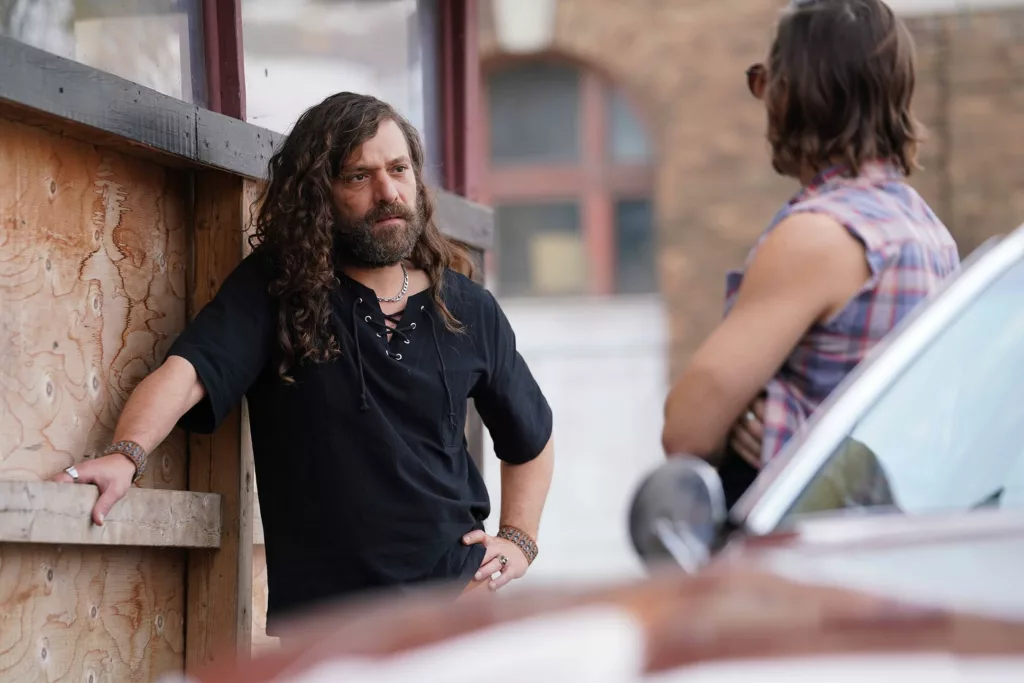The crime-ridden streets of 1970s Montreal come alive in Dusk for a hitman. Based on the true story of Donald Lavoie, a notorious gang enforcer, the film transports viewers back in time. We meet Donald, a man who makes his living carrying out hits for local crime boss Claude Dubois. Life is steady for Donald; he does what’s asked without question and provides for his family in return.
But troubled times are ahead. When Claude demands Donald kill his own brother Carl, who’s creating problems, Donald is faced with an impossible choice. Meanwhile, Detective Roger Burns is hot on their trail, putting pressure on the whole operation. As danger mounts from all sides, Donald realizes his unquestioning loyalty may lead only to ruin. With enemies mounting and trust fading fast, he must find a way to navigate this dark world he never meant to stay in for too long.
Director Raymond St-Jean grips the audience with this gritty glimpse into the criminal underworld. Though events are fictionalized to some extent, the raw portrayal of 1970s Montreal feels authentic. Éric Bruneau owns the role of Donald with his complex, lived-in performance. As Donald wrestles with competing loyalties, we become invested in his fate. While not all characters receive depth, Dusk for a Hitman shines brightest, exploring one man’s gradual disillusionment amid corruption and conflict. For a thoughtful crime drama that stays long in the mind, this story of a hitman in trouble times is worth your time.
Life in the Shadows
The film follows Donald Lavoie over the course of a few turbulent years. As a top enforcer for crime boss Claude Dubois, Donald does whatever’s asked without question. For years, things ran smoothly: he took care of loose ends and collected debts, providing for his wife and daughter in return.
But darker times are ahead. Tensions rise when Claude demands Donald kill his own brother Carl, who’s become a nuisance. Donald is torn between family loyalty and his duty to Claude. Meanwhile, Detective Roger Burns closes in, seeing a chance to bring down the whole operation.
Caught in the middle, Donald starts to realize his unquestioning service may cost him everything. Éric Bruneau brings Donald to life in all his complexity. You understand his inner conflict yet also the cold calculation required for his “work.” While the script could’ve offered more background, Bruneau ensures you fully feel Donald’s dilemma in every scene.
Contrasting Donald is the one-dimensional portrayal of other characters. Claude mostly exists to further Donald’s story. Rose-Marie Perreault does her best with Donald’s wife, but the character remains an afterthought. Their daughter receives even less focus, existing merely as a plot device.
It’s a disappointment that the film doesn’t bring more depth to those orbiting Donald. His family life feels hollow, undercutting the emotional impact of his shifting motives to protect them. Still, Dusk remains a gripping, tragic character study thanks to Bruneau’s terrific lead performance. Even when the world around him feels paper-thin, his turmoil and slow disillusionment grip you to the very end.
Capturing the Chaotic Criminal Underworld
St-Jean really transported viewers back to 1970s Montreal. From the opening scenes, you feel like you’ve walked into this dark criminal world. All the small details, like the clothes and cars, help set the tone.
A lot of credit goes to Jean-François Lord’s cinematography. He has a real knack for capturing atmosphere. Every scene feels tense and uncertain. Even some of the quieter moments leave you on edge, wondering what might happen next.
There’s one scene where Lavoie is meeting an informant at a dock at night. It’s pouring rain with barely any light around. You really feel like you’re right there in that sketchy situation. Another tough meeting with the boss stands out, where every subtle movement might make or break Lavoie.
St-Jean has a real flare for composing shots, too. He frames characters in interesting ways that draw you in instead of distracting. In that tense rain scene, the space between Lavoie and the other guy keeps you guessing about their dynamics. It’s those little directorial touches that keep viewers immersed in this unforgiving criminal world.
The gritty style also makes the violence more impactful when it does happen. St-Jean doesn’t dwell on graphic scenes but knows how to maximize their effect. One hit that went wrong in a dark room made me unexpectedly anxious. They stick with you because the whole atmosphere is so unnerving from the start.
While the story moves at a steady pace, St-Jean ensures it never feels slow. Every choice, from the setting to the cinematography, continues to build anticipation for what may unfold. Even on a re-watch, Dusk for a Hitman retains its ability to pull viewers straight into the chaos of Lavoie’s life. It’s a gripping world that St-Jean crafted remarkably well.
Stealing the show
This film lives because of its incredible central performance. Éric Bruneau brings Donald Lavoie vibrantly to life in a way that keeps you captivated from start to finish.
He has a real ability to say so much without words. You feel the conflict raging inside Lavoie with every look. Bruneau also nails the more brutal, hardened moments. One scene where Lavoie casually strangles someone had me tense just watching.
But what I appreciated most was how he showed Lavoie’s humanity. Bruneau finds tiny glimpses of empathy or pain that make this cruel character surprisingly multidimensional. Even in killings, he hints at loneliness or regret beneath the surface. It’s an emotionally complex portrayal that drove the whole narrative.
Naturally, antagonists like Lavoie’s boss, Claude, needed to be equally gripping. Benoit Gouin has the perfect cold, calculating energy as the crime leader. Just a word or glance from him puts you on edge. Their tense exchanges are highlights that Gouin steals with his unnerving presence.
Beyond the leads, some supporting roles feel thinner. Lavoie’s family gets short shrift at times. You want to see more of the strained sibling dynamic, too. It’s a shame these factors lacked the richness of Bruneau’s work.
Still, with Bruneau at the center, this remains a tour-de-force of acting that lifts the whole production. Even in lesser scenes, his commanding performance carries you along. It’s a stunning example of how one committed actor can elevate material and keep you glued to the screen. With Bruneau in top form, Dusk for a Hitman undeniably succeeds on the strength of its mesmerizing lead.
Walking in the dark
Dusk for a Hitman delves into some deep themes around what it means to survive in the criminal world. Through Lavoie’s journey, it explores moral ambiguity, redemption, and the conflicts that arise when ethics meet existence.
Lavoie finds himself trapped in a life of violence, answering Dubois’ unlawful demands. Every choice presents new dangers: follow orders and betray his values, or resist and risk serious consequences. It’s a situation that challenges even his sense of self.
As the film progresses, Lavoie’s priorities shift from pleasing Dubois to protecting his family. But in this dark underworld, no path leads simply to safety. Both routes involve compromising his morals in some way.
The film leaves us questioning how far someone might get to save themselves and whether redemption is possible after the things Lavoie has done. It portrays the criminal world as a grim place where goodness becomes twisted through necessity.
Ultimately, the movie suggests that being in Lavoie’s shoes leaves a person with no truly good options—just varying degrees of wrong. No matter the choice, some betrayal is unavoidable, and the threat of violence is ever-looming.
It’s a bleak perspective, presenting crime not as exciting or glamorous but as an entrapping system where even the strongest willed can find their ethics eroded by the demands of survival. Lavoie’s inner conflict shows the stain such a life can leave on the soul.
While not condoning his acts, the film aims to make us understand Lavoie’s dilemma and what might drive someone into compromising themselves. Through his character, it offers a layered look at the murky ties between morality and our will to endure in a dark world.
In the end, Dusk for a Hitman leaves us with no easy answers—only questions about how far we ourselves might be pushed if faced with similar impossible choices between loyalty, family, and life itself.
Cultural nuance and criminal kindness
Dusk for a Hitman charts its own path within the crime genre by representing its local culture and influences on screen. While it shares DNA with gritty mobster films, St-Jean instills this story with a Quebecois flavor.
Lavoie’s world feels authentic thanks to settings right in Montreal. The city comes to life as more than just a backdrop; we see how the place impacts this criminal life. It gives the characters cultural nuance often missing in American films set elsewhere.
Comparatively, works like Goodfellas showcase a flashy New York lifestyle instead of Dusk’s hardened realism. And French films like Mesrine show how exported criminals adapt abroad versus homegrown operations. Both offer style over substance, whereas St-Jean emphasizes psychological substance.
Within the director’s varied oeuvre, this stands out for its unflinching morality play. Where lighter romances buoyed spirits, here he probes the darkness dwelling in us all through difficult decisions. Éric Bruneau’s layered performance drives that internal strife to profound depths.
So while crime genre benchmarks exist, Dusk forges its own path with care for Quebec identity. It paints criminals as people, not stereotypes. And it questions society’s role in cultivating such environments rather than glorifying them. For these thoughtful insights, the film deserves recognition amongst its international peers.
Final Thoughts on a Criminal’s Tormented Journey
In many ways, Dusk for a Hitman delivers a compelling criminal saga thanks to St-Jean’s direction and Bruneau’s conflicted performance at the center. Lavoie feels like a fully formed character wrestling with impossible choices that tragically shape his fate.
Some weaknesses hold it back slightly. Surrounding roles lack depth, leaving aspects of Lavoie’s motivation unexplored. And its bleak tone won’t resonate with all viewers seeking escapism.
Yet these flaws do little to undermine the film’s overall achievement. It tells a memorable human story within a realistic criminal underworld. St-Jean invites us inside the mind of a conflicted man, using the genre as a vessel for psychological substance.
More than mere entertainment, Dusk stimulates thought on society, loyalty, and the capacity for change within us all. Its gritty authenticity sheds light on the flawed humans beneath stereotypical villains.
While not perfect, St-Jean’s vision makes this worthwhile viewing for those seeking drama with lasting resonance. Lavoie endures as a complex character who recognizes too late what really matters. His journey continues to provoke discussion long after the closing credits. For this thoughtful achievement, Dusk for a Hitman deserves recognition and consideration by serious cinema fans.
The Review
Dusk for a Hitman
In conclusion, while not without its flaws, Dusk for a Hitman succeeds in telling a memorable human story within the criminal underworld. Anchored by Bruneau's conflicted performance, St-Jean crafts a gritty drama that stimulates thoughtful reflection on societal influences, loyalty, and the capacity for change. While not perfect entertainment, the film makes its mark through authentic and resonant characterization that lingers with the viewer long after.
PROS
- Complex central performance from Eric Bruneau
- A gritty and realistic portrait of the 1970s Montreal criminal underworld
- Thought-provoking themes around morality, loyalty, and personal change
- Strong direction and atmosphere from Raymond St-Jean
CONS
- Surrounding characters lack dimensionality
- Slow pacing may not appeal to all audiences
- Cultural details may go over some international viewers' heads
- Storytelling weaknesses hold dramatic potential back slightly





















































